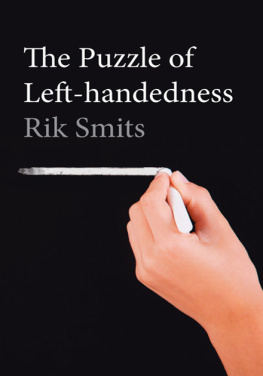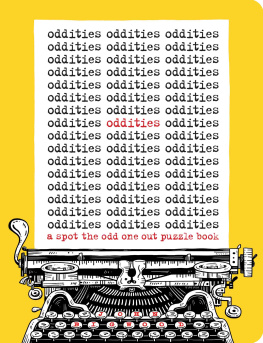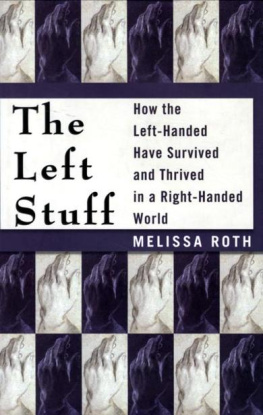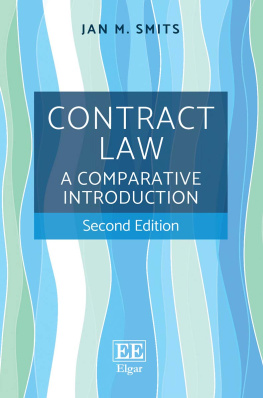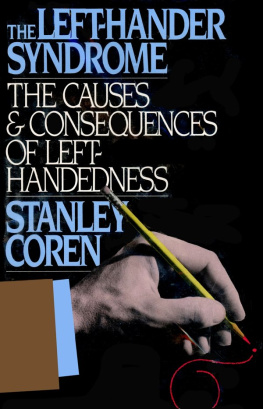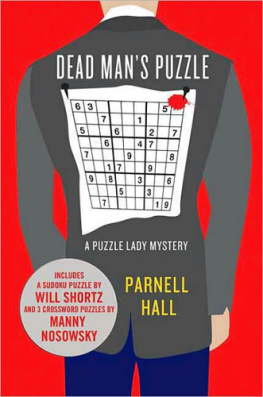Published by
Reaktion Books Ltd
33 Great Sutton Street
London EC1V ODX, UK
www.reaktionbooks.co.uk
Het raadsel van linkshandigheid was first published by Nieuw Amsterdam,
Netherlands in 2010 as a revised and expanded edition of an earlier edition
entitled De linkshandige picador, published in 1993 in the Netherlands by
Nijgh en van Ditmar.
Copyright Rik Smits 2010
First published in English 2011, reprinted 2011
English-language translation Reaktion Books Ltd 2011
English-language translation by Liz Waters
This publication has been made possible with financial support from the
Dutch Foundation for Literature
All rights reserved
No part of this publication may be reproduced, stored in a retrieval system, or
transmitted, in any form or by any means, electronic, mechanical, photocopying,
recording or otherwise, without the prior permission of the publishers.
Page references in the Photo Acknowledgements and Index match the printed edition of this book.
Printed and bound in Great Britain
by MPG Books Group
British Library Cataloguing in Publication Data
Smits, Rik.
The puzzle of left-handedness.
1. Left- and right-handedness.
I. Title
152.335- DC 22
eISBN 9781861899743
1
Malice and Misunderstanding
My husbands left-handed too. The young woman sounded worried. Is he going to die young? I couldnt help laughing; here we go again. The story that the average left-hander dies an untimely death has been around for decades. Its a dark fairy tale thats proven tenacious for two reasons. Every once in a while a scientist comes along whos happy to breathe fresh life into it simply for the sake of causing a sensation, but more important, perhaps, is the eagerness with which the vast majority of right-handed people embrace the story every time it crops up. What could be nicer than a good safe shudder? Whether or not its true isnt really the point. Its mainly a matter of guilt-free gloating.
The ease with which such stories circulate on the global rumour mill suggests that people dont really believe them. The version most commonly heard is that left-handers die an average of nine years sooner, and that by about the age of forty most have disappeared. Were that truly the case, then left-handedness would be an extremely grave affliction, a scourge claiming a huge number of young lives the kind of illness people talk about in veiled terms, preferably in acronyms.
Have you heard? Carolines got LH !
What? Her too?
Yes. You didnt hear this from me, but...
Gee... That family sure has it hard.
This is not the sort of thing people say.
It all started in 1992, when a Canadian professor of psychology by the name of Stanley Coren published a book in which, based on his own research, he drew attention to the horrifying fact that left-handed people have lifespans nine years shorter than average. He called it The Left-Hander Syndrome. Theres no denying that Coren had a feeling for drama; he made rather a name for himself with his book and it earned him a tidy fortune. Then people simply got on with their lives. No politicians asked questions in the House; no specialists appeared in the media to inform the public. We didnt even see any worried left-handers forming action groups, or fearful parents-to-be demanding early pre natal testing for this fatal disorder. Nobody pressed for further research. Nowhere in the world was there even a well-meaning government information campaign. Speculation about left-handed mortality was and remains public entertainment which is not something real illnesses are.
Corens book fitted a pattern that often emerges when left-handedness makes news: something grabs our attention, but its never more than a flash in the pan and left-handers themselves usually decline to comment. Thats another thing right-handed people always seem to overlook. In 1998 Australian biologist and journalist Geoff Burchfield asked the psychologist Michael Corballis in an interview: Why do you think the subject of handedness triggers such strong responses in people, especially lefties? Corballis began in all seriousness to articulate a detailed answer, but he soon got bogged down in meaningless platitudes. Not that Corballis is stupid, far from it, but the question was as natural as it was misconceived. The unconventional preference exhibited by left-handed people, whom Burchfield rather dismissively refers to as lefties, is in reality something that astonishes and preoccupies right-handers. They regard the left-handers they come across from time to time as peculiar and indeed intriguing and faintly creepy whereas for left-handed people its the most normal thing in the world. They dont see themselves and their like as in any way odd, and they are entirely used to living in a right-handed world. From an early age they have grown accustomed to the strange fascination their aberrant hand preference engenders in right-handed people.
This is a pity, really, because although right-handers get thoroughly het up about the problems they perceive to exist while left-handers merely shrug, all sorts of real puzzles remain. Along with language and cooking, the fact that the vast majority of human beings have a distinct preference for the right hand is one of relatively few characteristics that are unique to our species. Preference for one hand or paw over the other is not unusual in itself in fact it can be found in a wide range of animals, even in mice but the uneven distribution of left- and right- handedness is a different matter. Only one in ten people regard them selves as left-handed, whereas among animals it seems that a roughly equal number favour the left paw as favour the right.
No one can yet say with any certainty just how it comes about that one person is right-handed and another left-handed. Equally puzzling are the reasons why left-handedness arose in the first place. It must have happened a very long time ago, because another puzzle is why down through the centuries, all over the world, there has always been a stable left-handed minority of around ten per cent. Thats not all. Hand preference reflects a deeper, all-pervasive quality of human beings, namely the fact that each cerebral hemisphere has its own distinct functions, yet in most left-handed people the layout of the brain seems to differ little if at all from that of right-handed people.
As if all this wasnt confusing enough, the concepts left and right are problematic in themselves. We find it hard to learn which is which, and even in adulthood we can quite easily mistake one for the other. Driving instructors are all too well aware of the possibility that a nervous pupil will yank the steering wheel in the wrong direction. Never theless, there are innumerable ways in which the distinction between left and right determines how we order, experience and comprehend the world. Photographs, drawings and paintings comply with implicit laws of orientation, as do films and comic strips.
Despite how successful some left-handers are, and how inconspicuous most remain, throughout history left-handedness has been associated with clumsiness and with unpleasant traits such as untrustworthiness and insincerity. The Latin word for left, sinister, has all kinds of dark, dismal and ominous connotations that have come into everyone of the many languages related to Latin. Science has thrown its weight into the ring at regular intervals. At the end of the nineteenth century infamous skull-measurer Cesare Lombroso had no hesitation in saying that left-handedness was a sign of a criminal personality, and in the mid-twentieth century prominent American psychoanalyst Abram Blau announced that left-handedness was tantamount to infantile negativism, the equivalent of a refusal to eat everything on your plate. Neither of these eminent gentlemen had the slightest evidence for their harsh judgements, but they werent going to let that spoil their fun.


